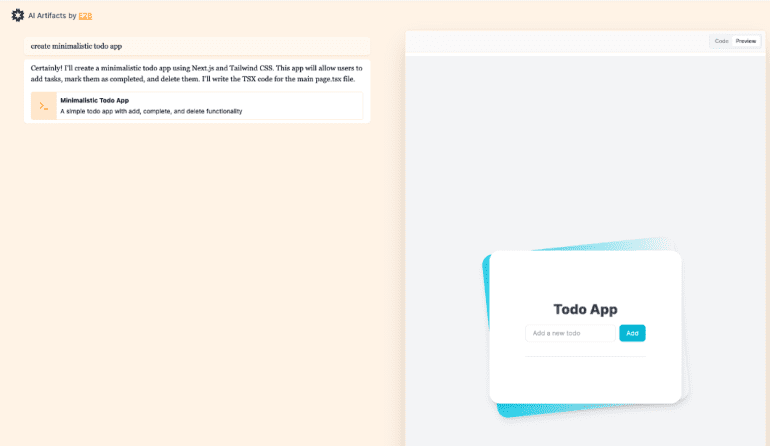- Developers face challenges with safely executing AI-generated code, which often involves security risks and complex setups.
- Existing solutions are limited by language constraints or lack of advanced AI model integration.
- The AI Artifacts app is an open-source tool derived from Anthropic’s Artifacts UI.
- It integrates Claude Sonnet 3.5 for AI code generation and uses E2B’s Code Interpreter SDK for secure code execution in sandboxed environments.
- The app supports Python code in Jupyter Notebooks and Next.js applications, with future plans for JavaScript, TypeScript, and R.
- It features real-time streaming of AI-generated code for enhanced user interaction.
Main AI News:
Developers often encounter the problem of executing AI-generated code safely. Local execution can present security vulnerabilities and demand considerable setup, necessitating a tool that supports multiple programming languages and frameworks while maintaining security and functionality.
Current solutions offer partial fixes. Some provide secure environments for code execution but may be restricted to certain languages or lack advanced AI model integration. Others fall short in flexibility or security for open-source and professional use.
Introducing the AI Artifacts app, an open-source variant of Anthropic’s Artifacts UI. This application leverages the Claude Sonnet 3.5 model for AI-driven code generation and utilizes the Code Interpreter SDK from E2B for secure code execution within sandboxed environments. This configuration ensures the safe operation of AI-generated code across various languages and frameworks.
The AI Artifacts app distinguishes itself with notable features. It supports Python code execution within Jupyter Notebooks, catering to data analysis and scientific tasks. Additionally, it can generate and execute Next.js applications, widely used for web development. Future updates will include support for vanilla JavaScript, TypeScript, and R, along with streaming capabilities for real-time AI code feedback.
The app’s versatility and practical application are underscored by its integration with the E2B Code Interpreter SDK, which provides secure, isolated code execution. The inclusion of Vercel AI SDK for tool interactions and streaming responses from the Claude model further amplifies its capabilities. The AI Artifacts app’s readiness to handle Python and Next.js code exemplifies its value in diverse development environments.
Conclusion:
The introduction of the AI Artifacts app represents a significant advancement in the market for secure and versatile AI code execution tools. By addressing the security and functionality gaps of existing solutions, it offers a robust open-source alternative that supports multiple programming languages and frameworks. This positions the app as a valuable resource for developers seeking to safely and efficiently integrate AI-generated code into their projects, potentially setting new standards for code execution and development practices.

